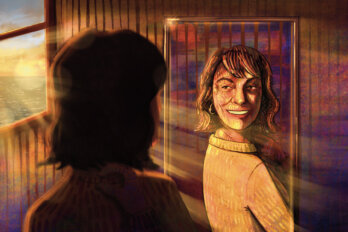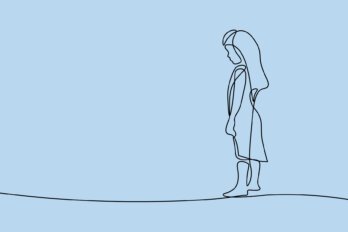When you are very young and you are an artist, the other children think that you are insane. Unless, of course, your parents foster that and send you to an art school. But if you’re a kid whose dad is a janitor and you’re heading off to a regular public high school, you will be a loner.
I had a photograph of Virginia Woolf in my locker instead of Luke Perry. I sat in the library at lunchtime making small collages. I dressed in a velvet suit from the thrift shop. I was working on a screenplay about art thieves. I read philosophy books and plays. The other kids knew there was something off about me; I was too withdrawn, and I had no interest in them. I had nothing in common with them. I would always rather be working on a manifesto.
Chris came to my high school in grade eleven. He said he was heading to his school one day and decided he needed a change. He looked through the phonebook for other high schools. He asked each one if there was room. When he got to mine, they said he ought to come right down. He got on the metro and came all the way across town. He was wildly popular.
He caught my attention in drama class. He had these really interesting theatrical interpretations. He performed his monologue from Hamlet as though he were Tom Waits in an interview—on a stool, smoking a cigarette. It was as though he hadn’t even bothered to read the rest of the play. He reminded me of someone who might be shot in a duel over something trivial. He performed Violent Femmes a cappella for the talent show. That was just one of the greatest things I’d ever seen.
One afternoon, he came up to the locker next to mine and leaned against it, looking at the photocopies on the door. He was wearing a pair of pants that had mismatching legs.
“Did you buy those pants looking like that?” I asked.
“I cut the legs off two different pairs of pants and I sewed them back on the opposite ones.”
“Why?”
“I was inspired.”
“Is your tattoo of John Lennon?” I asked.
“Yes. I just got it last week. Unfortunately I got fired from the ice cream parlour where I worked because of it.”
“I like John Lennon too. Do you like Fellini films?” I asked.
“He’s my favourite filmmaker!” he exclaimed.
Although he later confessed that he had no idea who Fellini was, we went to see Satyricon together on Friday night at the repertory cinema. It was our first date. We talked about the film and all sorts of other intellectual things that sixteen-year-olds could be capable of. He didn’t think that I was crazy. He loved everything that I had to say.
“Is it true that you were raised in a cult that was just raided last year? And that you showed up at school the first day without shoes because you’d never worn them before.”
“Where did you hear that?” I asked.
“It’s what the other kids say.”
“No.”
“Too bad. Can I kiss you?”
“Yes.”
We always had lunch together after that. We carefully began to craft a sensibility together. We gathered things that struck us as appealing, or romantic, or intriguing, and shared them with one another. A photograph from a magazine by Mary Ellen Mark; a book of poems by Charles Bukowski; a documentary about Bob Dylan; a philosophical dissertation by a French revolutionary; a book of drawings by Jean-Michel Basquiat; a play by Samuel Beckett; a recording of Dylan Thomas; a dirty book by Anaïs Nin.
We consumed them and discussed them together. We allowed them to alter our personality, to make us deeper, more romantic, drunk on life, desperate to document the elusive states of love and evil.
We made look books, like film directors, of what we wanted our lives to look like. We were making rough drafts of what we want our lives to look like. I think that when you are young and in love, you are engaged in a creative collaboration. You create personas for one another. There is no art without a persona. You can only write once you have created a persona—a romantic objectification of yourself that will narrate your life in a way that makes your themes and concerns relevant.
We found the line between madness and genius to be a thing of great beauty. We discussed it at great length over our peanut butter sandwiches. We began to see one another as inhabitants of these bohemians worlds. We were like Henry and June Miller watching a puppet smoke a cigarette in New York City. We were like Simone de Beauvoir and Jean-Paul Sartre debating the nature of responsibility in a Parisian café. We were like Arthur Rimbaud and Paul Verlaine chasing after one another with pistols in a garret. Most of all, we were capable of great artistic feats, like these provocative geniuses we adored.
At graduation, I won a scholarship for having the top overall grades in the school, the English prize, and the Phys Ed award. Chris won the student union award for having the best personality. He didn’t come on stage to accept it. He was skateboarding in the park under a full moon.
He changed the college that he was applying to so that we could go to the same one. University was wonderful. It was so cheap to live in Montreal in the late nineties. We lived in sprawling Victorian apartments where we could sit in the window frames and have a mattress on the floor of a giant room with a tin ceiling of roses over us. Our breath was small clouds of smoke coming out of our mouths. We got a tiny white kitten with a black masquerade mask. I named him Ben.
“That’s the worst name I’ve ever heard for a cat,” Chris said to me. “You’re the only girl I know who makes me laugh. And the only poet I’ve ever met.”
Our cat turned out to be the greatest cat that the Plateau has ever known.
There’s the inevitable feeling that you get when you are in university that everything is actually going to work out for you. Your generation is as yet undescribed. It is a giant black art journal and you can write whatever you want in it.
All through it, I wrote plays that he starred in. In theatre class, in coffee houses. I made short films for him to act in. There was something special about the way he interpreted words. He was fearless. It was as though he were always naked. And as though everything he read was about sex.
The narrative we wanted for ourselves was also supposed to be fraught with drama. They say there are no children who want to grow up to be junkies. I assure you, there most certainly are. I can attest that reading a certain type of novel is a gateway drug. And we were reading all of them. So many of our heroes were drug addicts.
Our friend Richard knew a girl who had moved down to New York City to study philosophy. We piled in the car and drove down together to visit her. There I was in a peacoat, jeans with holes in the knees, a barrette with a metallic rose in my hair, staring up at Times Square with Chris. We were shocked. We felt so tiny. We were like little mice. We were so excited by life and the idea of the new and the things that were possible.
Richard’s friend had subletted an apartment from an old woman who was in the hospital. She had been living in the tiny penthouse apartment of a six-floor walkup for decades. It was covered wall-to-wall with books. Even the bathroom was lined with books. It was magical. She had oil paintings of flowers leaning against the wall on top of the bookshelves, and black-and-white photos of her friends and her life. She had taken the stickers off her fruit and stuck them on the back of the front door. Not an inch of it was uncovered.
It was exactly like the 1920s Parisian garrets of writers that I had imagined. Such a rich intellectual life had taken place in this nook of the world.
And then Richard’s friend told us that lately she had been using heroin.
Thinking that you can do heroin is like a mouse tiptoeing out under the stage light of a table lamp and dancing a pas de chat, tempting the house cat. You feel so bold and courageous. But you don’t have any power in the situation. You don’t stand a chance.
It kills you. But it’s a slow death, as it likes to play with its victim, like a cat with a mouse, enjoying its power. One of the five of us in that room playing Russian roulette, figuratively speaking, was bound to get the bullet in our head. It just made statistical sense. It was an inevitability.
It was Chris who would die of an overdose after twenty-one years of addiction, two summers ago.
After you start seeing someone, they feel authorized to offer you a textual interpretation of yourself. They offer you readings and analysis of yourself, as though you are a character in a novel and they are going to pin you down, once and for all. Sometimes you date people who offer such ugly readings, calling you mundane or prosaic, overblown. These partners always want to convince your that their reading is not subjective, but the definitive one.
And then there are lovers that offer such wonderful interpretations of yourself. It’s as though you are up late listening to BBC and someone offers up a perfect and delightful interpretation of Elizabeth Bennett that you hadn’t imagined before.
If you are a masochist, you will obsess and remember the people who read you badly. But I prefer to remember the ones who thought of me as their favourite book, that they dropped everything to read, that they return to over and over, finding it wonderful and brand new. They have highlighted different passages of me, they found my tragic flaws endearing. They discovered stuff that makes me deep and memorable.
Chris read my life like a college student reads Henry Miller. Every word is exciting.
We separated after I got pregnant and the baby was born. We went on completely separate paths. There’s nothing (absolutely nothing) that gives me more pleasure than achieving goals that I came up with in that cafeteria. Who was I to dream big? Oftentimes, when I do accomplish something on my teenage fifty-year plan, I think, Oh, Chris must be impressed. The map I made for myself actually proved accurate. I braved it out to uncharted territories. He would know how far I came from, how hard it was to get here. And I wonder if he notices. And I always conclude, He must. I didn’t realize how much I did this until he died. Because then the answer was suddenly changed to, He can’t.
One of the main readers of my life was gone. And he was one who started the story so early on. That reader will not know the rest of the pages of this story. He will not get to know the end of my story, although I know the end of his.
Artists never work completely alone but forge some sort of coterie. They are inevitability influenced by the other artists and creative spirits that they come in contact with when they are young. (Or at least an affectionate tomcat?) Chris figures into the narrative of my life but also into my actual writing. You know how by the time you are five you have already developed your personality? I think by the time that you are about twenty-one you have already developed your characters. Some aspect of him is in many of my characters. Chris as a Dostoevsky villain. Chris as a Salinger malcontent. Chris as a Chekhov loser. He’s always there, in the narrative of me in one form or another.





